|
|
Chapter Twelve: The Island Paradise of Montserrat (1984)
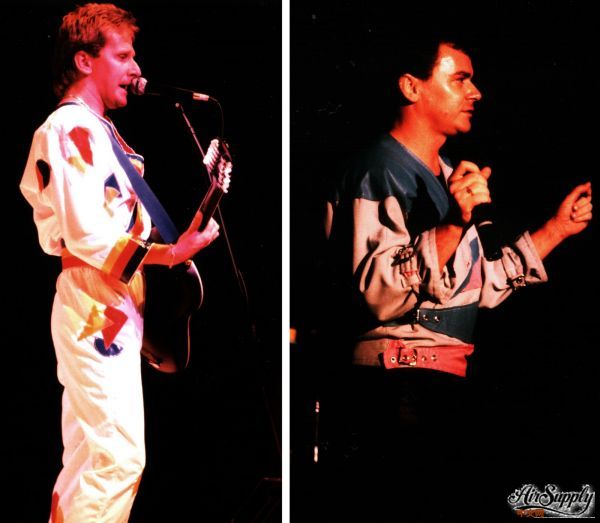
Live in Concert 1984
During the band’s heyday, Air Supply appeared on numerous television variety shows, late night and daytime shows, and everything in between. They were regulars on Solid Gold, a popular one hour-American musical variety television series that aired from 1980 to 1988. The show was taped in L.A., which was ideal for Air Supply since this was their main stomping ground when not home in Sydney. Solid Gold was the American equivalent to Countdown in Australia. The main premise of the show was to countdown the top 10 songs of the week based on the Radio & Records magazine chart lists. This created much confusion because most of North America followed the Billboard ranking. Solid Gold featured its own crew of dancers, who dressed like aerobic instructors. The show was extremely popular in North America, but was not admired by music critics because most of the performances were lip-synched, and the Solid Gold dancers often distracted from the music. Solid Gold served as the main vehicle for putting Air Supply’s image in front of the American public. This was critical in growing the band’s popularity because MTV refused to play Air Supply videos. The following is an almost complete list of appearances by Air Supply on Solid Gold:
Solid Gold Performance - 1986
October 11, 1980 - Guest Performer (All Out Of Love)
November 22, 1980 - Guest Performer (Every Woman In The World)
February 7, 1981 - 1980 Countdown. Guest Performer (All Out Of Love)
April 12, 1981 - Guest Performer (Lost In Love)
September 12, 1981 - Guest Performer (Here I Am)
October 31, 1981 - Guest Performer (Here I Am)
February 15, 1982 - 2 Hr ‘81 Countdown. Guest Performer (The One That You Love)
February 27, 1982 - Guest Performer (Sweet Dreams)
May 1, 1982 - Guest Performer (Sweet Dreams)
September 4, 1982 - Guest Performer (All Out Of Love)
October 9, 1982 - Guest Performer (Young Love)
January 15, 1983 - Guest Performer (Now And Forever)
February 15, 1983 - Guest Performer (Even The Nights Are Better)
May 21, 1983 - Guest Performer (Song unknown)
October 22, 1983 - Co-Host & Perform (Making Love & Sweet Dreams Duet with McCoo)
February 15, 1984 - 2 Hr Special ‘83 Countdown. Guest Performer (Making Love Out Of Nothing At All)
May 5, 1984 - Special Salute to Australia. Guest Performer (Even The Nights Are Better)
May 12, 1984 - Guest Host (No Performance)
May 17, 1984 - Guest Performer (The One That You Love)
May 26, 1984 - Guest Host (No Performance)
January 12, 1985 - Guest Performer (Making Love Out Of Nothing At All)
May 18, 1985 - Guest Performer (Just As I Am)
July 27, 1985 - Guest Performer (Just As I Am)
September 28, 1985 - Co-Host with Dionne Warwick (Medley with Warwick, plus The Power Of Love)
May 17, 1986 - Guest Performer (The One That You Love)
July 15, 1986 - Summer Special Episode - Guest Performer (Stars In Your Eyes)
November 1, 1986 - Guest Performer (One More Chance)
June 4, 1988 - Solid Gold Around The World. Guest Performer (The One That You Love)
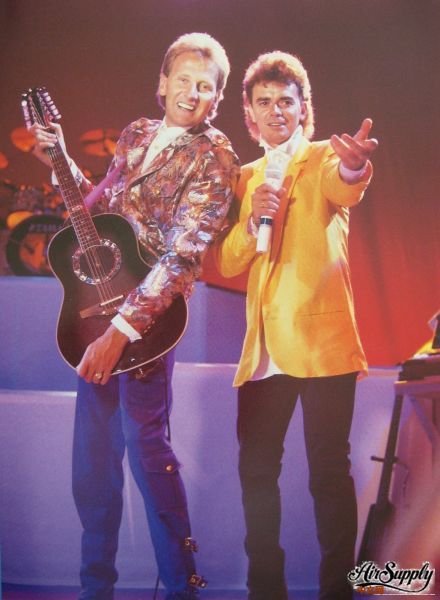
Solid Gold Performance - 1986
1984 was another turning point in Air Supply’s career. The ‘Greatest Hits’ album served as a watershed event, sharply dividing the band’s success in the early 80s, from what would follow. The band’s next album was critical because it needed to maintain the existing fan base, but also show growth and attract new listeners. Another lush orchestrated album, in the mold of ‘The One That You Love,’ would not attract new fans, and would most certainly disappoint music critics. Arista actively pursued new material for Air Supply.
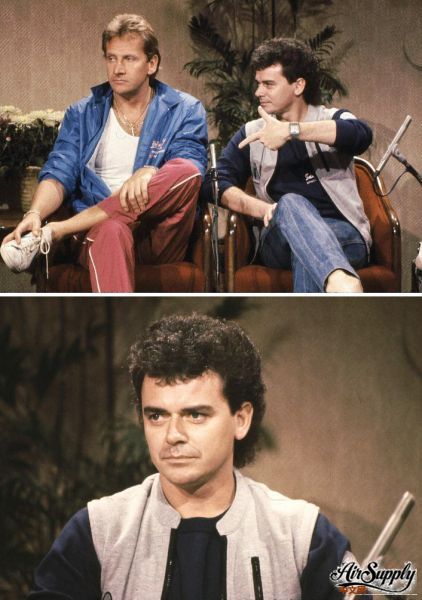
Graham and Russell both experienced changes with their philosophy on life. They became more health conscious and began a routine that soon changed their physical appearance. They enjoyed tennis, and played often during the tour of ’84. Some critics called Russell “The pudgy one,” but this stopped after he slimmed down for the band’s next album. “Since 1983, I’ve been much more conscious about my health, the job I was doing and my responsibility to the fans,” said Russell. “When I first got involved with Paula, I was having a love affair with a bottle of tequila. I was real unhealthy. She told me I should take care of myself, exercise. I said ‘yeah,’ when I get around to it. I’m impulsive, so one day, I started to exercise and I said, ‘This it it.’ I found the healthier I got, the better my voice got.”
In 1984, Graham moved to L.A. to live with Jodi. “When we were recording our second U.S. album in Sydney, I was living on the Central Coast of Australia,” recalls Graham. “I used to ride in on the train, and it’s a lovely ride down the coast to Sydney. I remember looking out over the sea and writing lyrics. I wrote the lyrics for ‘I Want To Give It All’ on the train, because at that stage I felt my destiny lay in America. I felt a bit sad because I had spent seventeen years in Australia. So this song is all about that. It’s really a sad song cause it’s about meeting people, and knowing that you soon won’t be there for them.”
Graham immersed himself in books about Metaphysics, a type of philosophy that explains the fundamental nature of being and the world. This world view was evident in his future song writing, especially in the 90s. Russell contemplated a move to the U.S. so he could be closer to his girlfriend Paula. Russell hoped to get married, but Paula learned from past relationships that jumping in too soon can be trouble. “It was really nice [with Russell] because we were friends first, and then we fell in love,” recalls Paula. “I had never had a relationship like that. It was always go in head first and come out soaking wet.”
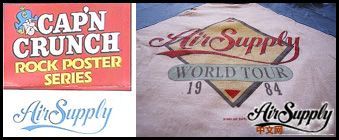
Air Supply targeted their younger audience when they signed a deal with Rockbill Communications to have posters appear in boxes of Captain Crunch cereal. Rockbill, a company who arranged corporate sponsorships and artist endorsements, worked previously with Air Supply on the Jordache concert program in 1983. In this latest promotion, Rockbill arranged for 15 million posters featuring Air Supply, Journey, Kool & The Gang, and the Romanitcs to be included in the cereal. The joint venture was a benefit to both parties as Air Supply received band exposure and licensing/royalty fees, while Rockbill featured its own advertising on the back of each poster. Rockbill started the first large scale mail order catalogue in the music business where fans could order products like T-shirts and memberships to fan clubs. A second wave of Captain Crunch posters was later issued, and featured bands Duran Duran, U2, the Rolling Stones and the Thompson Twins.
In early March, Air Supply travelled to Montserrat to record their next album with producer David Kershenbaum and freelance sound engineer Renata Blauel. Kershenbaum was responsible for the break through of Duran Duran in America, when he remixed the ‘Rio’ album, which was already a big hit in the U.K.. This allowed Capitol Records to change its marketing strategy on Duran Duran from New Romantic to dance band. Don Arden hoped that Kershenbaum could perform a similar transformation with Air Supply.
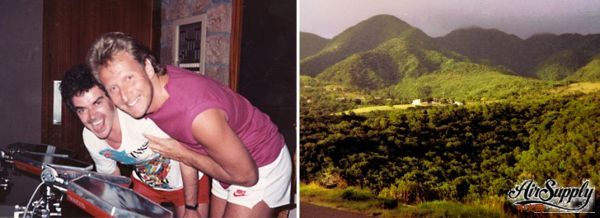
Russell & Graham in Air Studios Control Room - Montserrat 1984
The tiny island of Montserrat, located in the eastern Caribbean, was a popular recording destination because it featured a secluded state-of-the-art recording facility called Air Studios, owned by former Beatles producer George Martin. Music industry magazine, Pro Sound News, dubbed Air Studios as 1983’s ‘Studio of the Year’ in pop music. The recording facility was situated on a 400-foot-high aerie (Eagle’s nest) that overlooked rolling green hills below, and looked up towards the volcanic Soufriere Hills. The facility included two houses owned by Martin, and access to private villas, pools and tennis courts. Many British musicians chose to record here because Montserrat, a British crown colony, was considered an ‘offshore’ facility. This allowed them to avoid spending more than 90 days a year in Britain - the cutoff for legal residency and therefore from paying income taxes. For example, Duran Duran recorded ‘Rio’ at Air Studios, as did the Police with ‘Synchronicity.’ Air Studios Montserrat was abandoned by George Martin in 1989, after hurricane Hugo hit the island and damaged ninety percent of its buildings. Today, Air Studios is a vacant and eery structure with many of its original contents scattered on the floor.
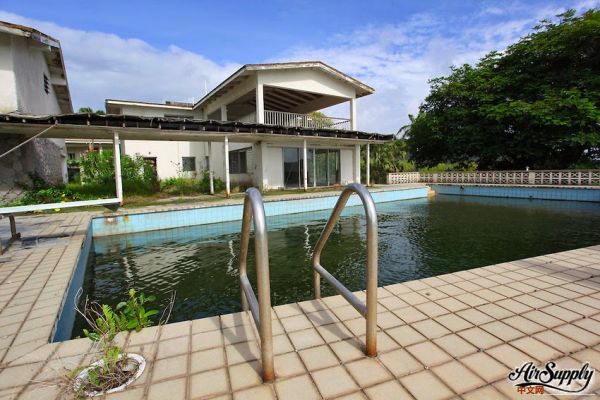
Air Studios, Montserrat
“One of my best memories ever of that time period was recording in Montserrat,” said Graham. “We’d already had a lot of success, but we were just getting exposed to a lot of different places and finding out what’s going on in the world. I’ll never forget that. It was great fun. We would record during the day and then hang out at a place I think was called The Chicken Shack. It was a local hole in the wall, but we would go there and listen to this fantastic reggae band. We sat there eating jerk chicken and listened to reggae until about 3 in the morning.”
After the recording session in Montserrat, Air Supply and Kershenbaum parted company and the recordings were shelved. They had spent a significant amount of money on the recording sessions, including $13,000 per day in studio rental. They had also flown in a digital recording machine from New York at considerable expense.
“Being in the studio in Montserrat was one of the musical highlights of my life,” said Don Cromwell. “Unfortunately, with a lot of the music they decided to go in another direction and it never made it to vinyl. We got home to Los Angeles and the album just didn’t translate like they wanted, so we ended up having to start from scratch.”
“It was nice to be in one place for several weeks, with twenty-four-hour access to the studio,” said Russell. “A place where you would not be distracted by anything but the music and the people you were working with. We produced some great stuff there. [But] it didn’t sound the way we wanted it to, because of a combination of a lot of things. It was obvious we had to go back into the studio again.”
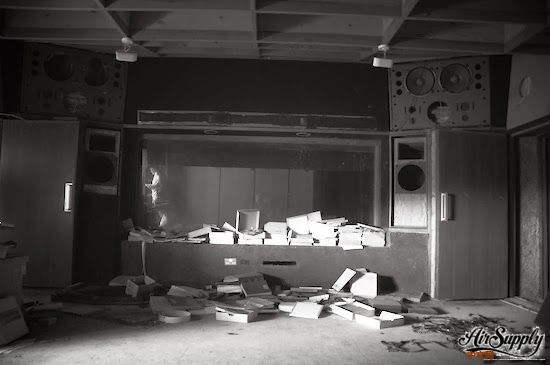
Air Studios Control Room - 2010
“We tried to record an album in Montserrat, where Paul McCartney had done some stuff,” said Ralph Cooper. “We thought that this was the place to be. We got there and started recording, and got all kinds of interesting stuff. We thought it was great. Desmond [the assistant] brought us Pina Coladas and we would partake of one or two of those, and then go cut some tracks. Then we splashed in the pool, which was ten feet from the recording studio. But at the end of the day there was a huge fight between the bands manager, Don Arden, and the producer. I think Don actually burned the master tapes. He put them in the fireplace. There’s only three tracks that exist, and I have them.”
David Kershenbaum’s contribution to Air Supply was not entirely lost. He had contacted Chappell Music to request a song similar to ‘Kiss on My List’ by Hall & Oates. They sent a song called ‘After All,’ written by Seth Swirsky, which later became an album track for Air Supply. “I was all of 23-years-old, and was writing for Chappell Music in New York, said Swirsky. “David [called me on Friday night] and told me what kind of song he was looking for. He wanted it in a minor key and I jotted down notes. Then I said, ‘Mr. Kershenbaum, I’ve got the perfect song for you. It’s everything that you’ve just described.’ I told him that I would Fed-Ex it to him on Monday. I recorded the demo at the Tiki Recording Studios in Glen Cove, New York, that Sunday. It was a fun session where all the musicians just clicked and the demo sounded great. Finally, late on Friday afternoon, one week to the day after we had talked on the phone, he called me to say that he loved the song for the group that he had mentioned, which turned out to be the multi-platinum band Air Supply. I couldn’t believe it! Air Supply, one of the biggest groups in the world, was going to record the song that I had just written for their much anticipated new record.”
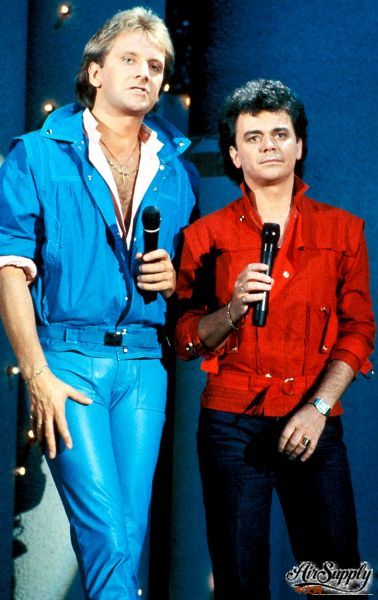
The 1984 World Tour started after the Montserrat sessions in late March, and included stops in Japan and many other countries in the Far East. They sold out two shows at the famous Budokan in Tokyo, which delighted John Brown, the Australian Federal Minister for Tourism. In 1982, Air Supply was chosen by Brown to act as ambassadors of Australia in Japan, and they were currently as hot as the Beatles were years ago in that country. Air Supply’s concert programs in Japan resembled an Australian travel brochure more than a typical rock band souvenir.
The North American portion of the tour began on May 28 at the Holiday Star Theatre in Merrillville, Indiana, and it showed Air Supply adding more rock-inspired tunes into the set list; ‘Labor Of Love,’ ‘Black and Blue,’ ‘Heart & Soul,’ ‘Make It Right,’ ‘Innocent Eyes, ‘Take Me Home Again’ and ‘The Way It’s Meant To Be.’ Air Supply was to include many of these songs on their new album, expected for release that summer. “We figured the time had come for us to do something different,” said Russell. “We’ll continue to do ballads because that’s what people want and expect from us. But it’s definitely time for a change as far as we’re concerned.”
The new songs went over quite well in the U.S., but were not as well received in Taiwan, where Air Supply performed for a second time on May 23, 1984. Their concert in Taiwan a year earlier was a success on every level, but something was missing this time around. The Free China Review wrote:
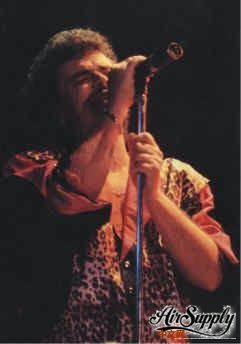
Live in Taiwan - 1984
At 7 p.m., a flood of teenagers, most in school uniforms, converged from various directions on the China Sports & Cultural Center to see the internationally recognized singing group Air Supply. Before the concert, as the lights began to go off, a smoky-green glitter began rising from the rear edge of the stage. Reflecting the ambient night light floating around in mystic prelude for the night's concert, the domed-auditorium became a spaceship. Simultaneously, the excited young audience emitted a mixture of shout, scream, and pure bristling whistle to welcome Russell Hitchcock on stage. He opened the concert with the group’s latest, ‘Take Me Home.’
Charisma is the key to an audience, and during the concert, the island’s eager young audience was clearly moved by Hitchcock’s dynamic-pleasant performance. He sang, danced, and continuously communicated with the audience. He walked around and smiled at people in different seating locations. Whenever his magic finger pointed at an auditorium section, the audience there responded with excitement.
In a pre-concert press conference, Air Supply announced that there would be several new songs and showed quite some confidence in them. However, during the concert, the audience did not respond the way the group expected to the new songs. Apparently, they did want to hear Air Supply’s old hits, and two keys from the guitarist were a sufficient hint to set them screaming before the vocalist intoned the lyric. Air Supply certainly failed to conquer the audience here as they had done previously. The auditorium was still as packed this time out, yet this year’s thousands of fans responded with notably less affection and excitement. The young girls still presented flowers to Hitchcock, and grabbed at him, but for his personal charisma, not the group’s performance. Some left before the concert was finished. They clearly did not enjoy Air Supply’s new songs - slow but not mellow, and the old hits were no longer fresh. New songs come and go. But some always last longer than others. Hopefully, Air Supply will find a new key and not fade out so soon. - Lew Wei-Liang, Free China Review
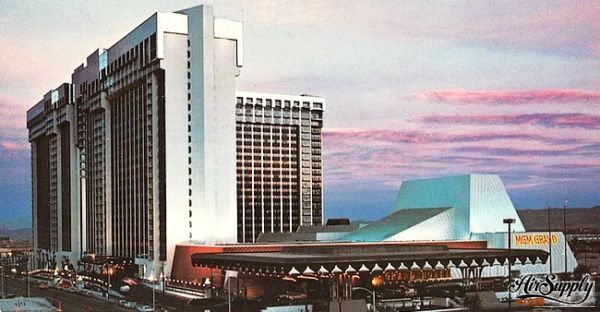
MGM Grand Hotel
In May, Air Supply signed a monster deal with the MGM Grand Hotel in Las Vegas. The deal contracted Air Supply to perform five weeks each year over the next five years, and paid the band close to $5 million. The first week of concerts took place on July 19-25. MGM Grand was one of the first megaresorts to open in Vegas in 1973, and was the largest hotel in the world for many years. By 1984, MGM Grand was still considered one of the most luxurious hotels in Vegas, and featured two large theatres: The Ziegfeld Room and the Celebrity Room, where Air Supply performed. $5 million was considered a large sum, but the success of ‘Greatest Hits’ made Air Supply one of the top five record selling groups in the U.S. for the first half of 1984. “Don Arden would say to us, ‘You’ve got to concentrate on Vegas,’” said Don Cromwell. “But back then Vegas was like the last stop where you went when you had nothing. Now it’s the place to go for the biggest of the big. But if you have the kind of catalogue [like Air Supply], and I think Don Arden knew this, we could play nothing but hits for an hour and a half, not like many bands with just one hit.”
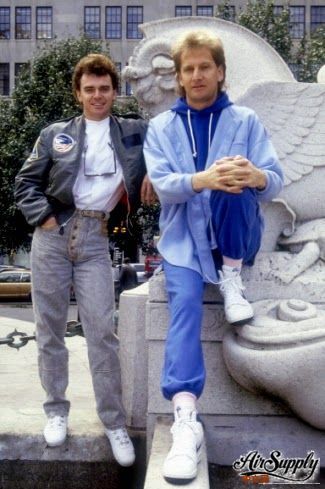
New York City - 1984
The North American leg of the tour sold out most dates, and concert promoters paid Air Supply top dollar to perform. The MGM Grand Hotel deal was just one example. But an inexperienced promoter in Windsor, Canada, soon learned the hard lessons of show business when they hired the band to perform at a fundraiser for the Windsor Stadium Development Corporation (WSDC) on June 10. The company hoped to use the profits from the concert to fund a feasibility study on the building of a large indoor facility in Windsor. The Beach Boys were hired to perform in 1983, and despite some electrical problems, the fundraiser was considered a huge success. But WSDC failed to properly evaluate the cost of hiring a band of Air Supply’s stature; they were demanding $40,000 to perform. Additional costs included $8,500 for the massive stage, $9,300 for power hookups, $2,736 in hydro usage, $2,475 per hour for a truck forklift, $4,700 for non-unionized stage setup crew and $1,000 to the City of Windsor to clean up after the concert. The WSDC chairman, Ivan Robich, admitted that his lack of experience dealing with a band of Air Supply’s magnitude hurt the overall success of the event. “I learned a lesson that we’re not in the promotions business. We don’t know how to negotiate with a band,” said Robich. An experienced concert promoter in Toronto felt that $40,000 was too much to pay Air Supply under any circumstance. “Many bands and agents will quote high-end fees to inexperienced concert promoters to see if they are for real,” he said. “They’d rather deal with tested producers who can handle the hassles and will pay up, whether the show gains or loses.” Regardless, Air Supply put on a tremendous show in Windsor and wowed the 5,500 paying customers. In reality, 7,000 people watched the concert, but 1,500 of those were free passes handed out by WSDC. The fundraiser finished in the red, but the concert promoters felt that Air Supply was a good choice given their popularity.
Air Supply made an ill-advised appearance in Sun City, Bophutatswana, South Africa, which at the time was considered controversial due to apartheid. The United Nations had already imposed a cultural boycott on South Africa in condemnation of apartheid. Many bands who performed in Sun City experienced fines and a political backlash, especially in Great Britain. Air Supply performed several concerts at the Sun City Casino and Resort’s 6,230-seat auditorium over a multi-day period from June 15-24. The band and crew justified their appearance by claiming they were not a political band, and that the concerts would not be segregated. However, when Air Supply arrived in South Africa, they realized the situation was not what they had been lead to believe. They hoped the backlash would be minimal, but they ended up on the United Nations Center Against Apartheid’s list of nearly 500 artists, musicians and actors targeted for boycotts. “I don’t care about politics,” said Russell. “We looked at it as an excellent opportunity to play for integrated audiences. We refused to play for segregated audiences, which I thought was a noble thing to do. I just want to play. I mean, if they told us we could only play for segregated audiences, I wouldn’t have agreed to it. This whole business of politics entering into things other than politics is what’s ruining the [1984] summer Olympics.”
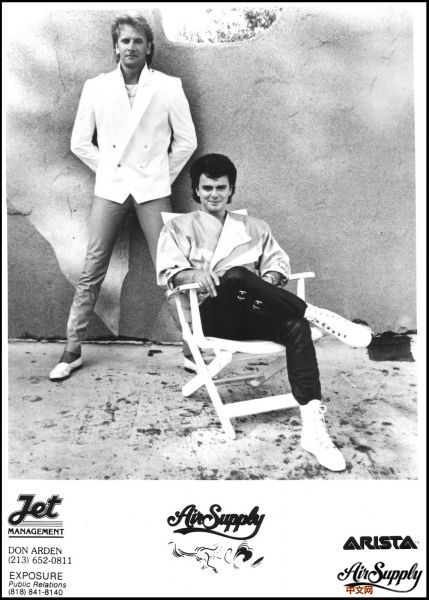
The press continued their criticism of Air Supply. Don Arden heard the negative backlash from those who did not appreciate ‘romantic pop,’ but he was not concerned because record sales were strong. “What do a few critics matter, compared to that sort of audience?” asked Arden. “You must have talent to sell so many records. They are going to be as big as Barry Manilow, maybe bigger because there is no one else doing what they do. These boys sing romantic ballads. So what if young girls want to hear them, and like to be romantic.”
Russell admitted that negative comments from the press have come largely as the result of an early marketing approach for which Air Supply and its record company must share the credit - or the blame. “The biggest problem we had was that the very first single we released was a ballad and that it was successful,” he said. “The company basically wanted more of the same. After the third ballad we suggested that they release something a bit more up-tempo, but they wouldn’t go for it and we didn’t press the issue. So obviously it isn’t all the fault of the critics. When all people hear from us are ballads, they’re thinking that’s all we can do. But we have benefited from not going with trends and we’ve suffered from it. I couldn’t go and dye my hair, and do that sort of stuff and be honest about it. We have always played the music that is from the heart, and that’s one of the reasons its been successful. People know you’re being honest with them.”
Don Arden got Air Supply involved in a marketing campaign for Chevrolet and RKO’s Live In Concert program. The sponsors ran a contest in which five individuals in five locations (Phoenix, Sacramento, San Fransisco, Los Angeles, Salt Lake City) won a 1985 Chevrolet Sprint by submitting an entry form at participating stores. Applicants received a free Air Supply poster at time of submission. The grand prize winner from each location was flown to New York to attend an Air Supply concert at the Westbury Music Fair on July 5, 1984. The entire concert was broadcast live-by-satellite over the RKO Radio network. After the show, Graham and Russell presented the grand prize winners with the keys to their new cars.
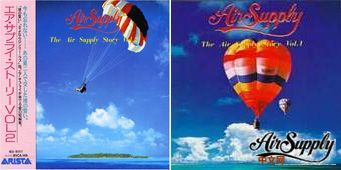
‘The Story of Air Supply’ - Volumes 1 & 2
Arista and Nippon Phonogram released two compilations for the Japanese market. The first, ‘The Story of Air Supply Vol. 1,’ was the complete ‘Lost In Love’ album plus half the songs from ‘The One That You Love.’ The second, ‘The Story of Air Supply Vol. 2.’ contained all the songs from ‘Now and Forever,’ and the other half of songs from ‘The One That You Love.’ The albums were not a hits collection per se, but a summary of the bands first 4 years with Arista. Both albums were later released on CD in 1988 and 1992.
Because Arista Records was owned by Columbia Pictures, they had access to its soundtrack albums. This was vital in helping Arista, still a relatively young label in the early 80s, establish itself in the music and film industry. “When it came to motion picture soundtracks,” said Clive Davis, “I was very selective about what we released. Each one had to have some element that made it truly stand out: the film itself, the composer, the opportunity to incorporate and launch hit songs. The recording artists we were breaking on Arista were pursued by music supervisors looking for songs to enhance their films. It was ideal synergy. This type of creative interplay between Arista artists and films would deepen and achieve more success in the Eighties and Nineties, long after our connection with Columbia Pictures had ended.”

'I Can Wait Forever' Single
‘I Can Wait Forever’ was originally recorded as a new track for Air Supply’s 1983 ‘Greatest Hits’ album, but was instead included on the platinum certified Ghostbusters movie soundtrack. Prior to Saturday Night Fever, rock and pop music played a limited role in the movie business. But this all changed after Flashdance in 1983. In 1984, ten soundtracks achieved platinum certification in the United States. The Ghostbusters soundtrack was an eclectic mix of music released by Arista Records, and featured many of its own artists such as Thompson Twins, The Bus Boys, Ray Parker Jr. and Air Supply. It included the huge hit, ‘Ghostbusters,’ by Ray Parker Jr. which earned him an Academy Award nomination for Song of the Year. ‘I Can Wait Forever’ and Thompson Twins’ ‘In The Name of Love’ were not featured prominently in the movie, but were both paid a significant royalty. ‘I Can Wait Forever’ was produced by Canadian hitmaker David Foster and Jay Graydon. It was written as a collaboration between Graham, Foster and Graydon and was never officially released as a single in the U.S. It was released in select international markets and received significant airplay. In Poland, it reached #16 and charted for 14 weeks. In Brazil, it was ranked as the 56th most popular single of 1984. “I remember recording the song at Jay’s house in L.A. and laughing a lot,” recalls Russell. “I also remember having a bit of a cold when I sang the vocal, and I can still hear it now when I listen to the song.”
Air Supply made their second entry into feature films when the sang the title song to the Warner Bros. Pictures’ release Grandview U.S.A. The song, ‘Take Me Back (To Grandview U.S.A.),’ was written and produced by Graham, and was included in the set list of Air Supply’s summer tour in ’84. Grandview U.S.A. starred Jamie Lee Curtis, Patrick Swayze and Jennifer Jason Leigh in a comic look at the currents of life in small-town Middle America through the eyes of three young people. The film, directed by Randall Kleiser of Blue Lagoon and Summer Lovers fame, was released throughout the U.S. and Canada on August 3. It did poorly at the box office. |
|